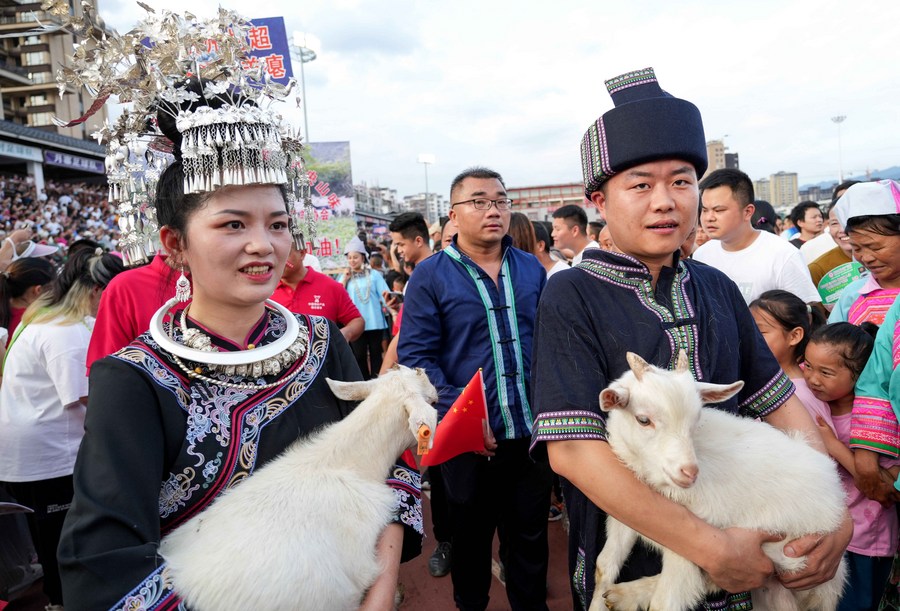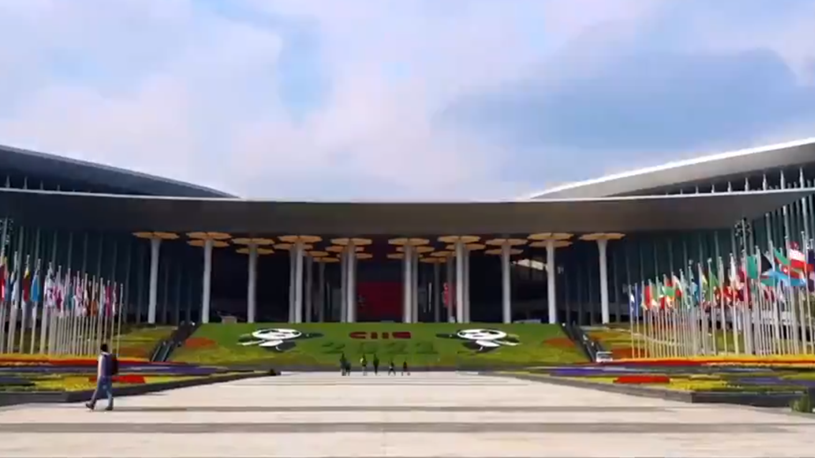
Spectators watch a match of "Village Super League" in Rongjiang County of southwest China's Guizhou Province, June 23, 2023. (Photo by Wang Bingzhen/Xinhua)
GUIYANG, July 28 (Xinhua) -- One can accurately say a mid-summer carnival is in town! China's "Village Super League" semi-finals starting on Friday may promise even more excitement than the Women's World Cup, or the Universiade.
At least so believe the locals in Rongjiang, a county in southwest China's Guizhou Province, where 80 percent of the residents are members of ethnic minority groups.
"I'm definitely looking forward to the semi-finals," said Yang Lin, 38. "I hope our team will make it to the finals, but I'm also eager to meet more football fans through the matches."
Yang's team, named after their village "Zhongcheng," which means loyalty, has shown its strength since the action started in May. "The competition is sometimes fierce, but friendship and joy always prevail."
These matches have drawn widespread attention from the locals as well as nationwide sports fans. Videos and live broadcasts of the event are viral on the web, having received more than 30 billion clicks so far.
Yang, who runs his own business, said he has made many new friends through football.

Players of Fenghuang Village and the team of Xinzhong Village compete during a "Village Super League" football match in Rongjiang County of southwest China's Guizhou Province, on June 9, 2023. (Xinhua/Yang Wenbin)
On Friday evening, his team will confront "Xinzhongcun," one of the youngest teams in the League, with an average age of 17 years.
"The love for football is in our blood," said Yao Maoqiang, 16. "In our village, even toddlers love to play."
The players participating in the Village Super League are from many different walks of life. Some are students, while others are butchers, vendors, construction workers, excavator drivers or business people. Among the referees are school teachers, government workers and ordinary villagers.
Such passion is boosted by a prevalent football culture and adequate infrastructure. Rongjiang County, with less than 400,000 permanent residents, has 14 standard football fields and nearly 40 amateur teams consisting of more than 1,200 players.
Xiang Yanqiong, 47, described the matches as "phenomenal" after watching the livestreaming of several rounds of games at home with her mother. "The stadium is fully packed, and so I decided to stay home with mom, leaving some room for those who have traveled all the way here to watch the matches live."

Villagers wearing festive ethnic dress enter the stadium before the "Village Super League" football match in Rongjiang County of southwest China's Guizhou Province, June 17, 2023. (Photo by Wang Bingzhen/Xinhua)
The event, accompanied by traditional ethnic singing and dancing on the sidelines, has drawn a nationwide audience to Rongjiang. Latest statistics show that from July 1 to 16, the county had received 921,200 visitors and reported over 1.075 billion yuan (149.85 million U.S. dollars) in tourism revenue.
A native of Rongjiang County, Xiang moved to Toulouse with her husband, a Frenchman, in 1997. She always visits her parents during the Chinese Lunar New Year in January or February, but has changed her schedule this summer. "When I saw videos of the Village Super League matches shared by my friends, I wanted desperately to come home and watch them -- there are so many familiar faces among the players."
Xiang's husband was unable to travel with her. "He'd have loved to, and he's really impressed by the football culture in town. During his previous visits, he was often invited to play out there on the field with complete strangers."
As Xiang sees it, the Village Super League is not just a feast of football. "The event and its impact are outcomes of my hometown's economic growth."
"When I traveled from Toulouse to Rongjiang 10 years ago, I used to land in Beijing, take a train to the provincial capital Guiyang and then change several buses before getting home," she said. The journey inside China could last several days back then.
Today, she gets to Rongjiang within a day after arriving in China, either by air or by high-speed train.

Referees communicate with each other during a match of "Village Super League" in Rongjiang County of southwest China's Guizhou Province, June 23, 2023. (Xinhua/Yang Wenbin)
It is not only the football fans who benefit from the matches. "Business has more than doubled over the past two months," said Zhou Guangmeng, who runs a restaurant that serves beef hotpot, one of the most famous dishes in town. "We work at least 12 hours a day. On weekends, more than 300 kg of beef is consumed daily."
Incomplete figures show that in Zhongcheng town alone, the 18 restaurants serving beef hotpot reported more than 10 million yuan in total business revenue since the football matches began in May.
"The hot, spicy beef is an indispensable part of the trip," said Li Jiachun, a tourist from Guangzhou. "I love the football matches, the ethnic culture and the hospitable people, too." ■












